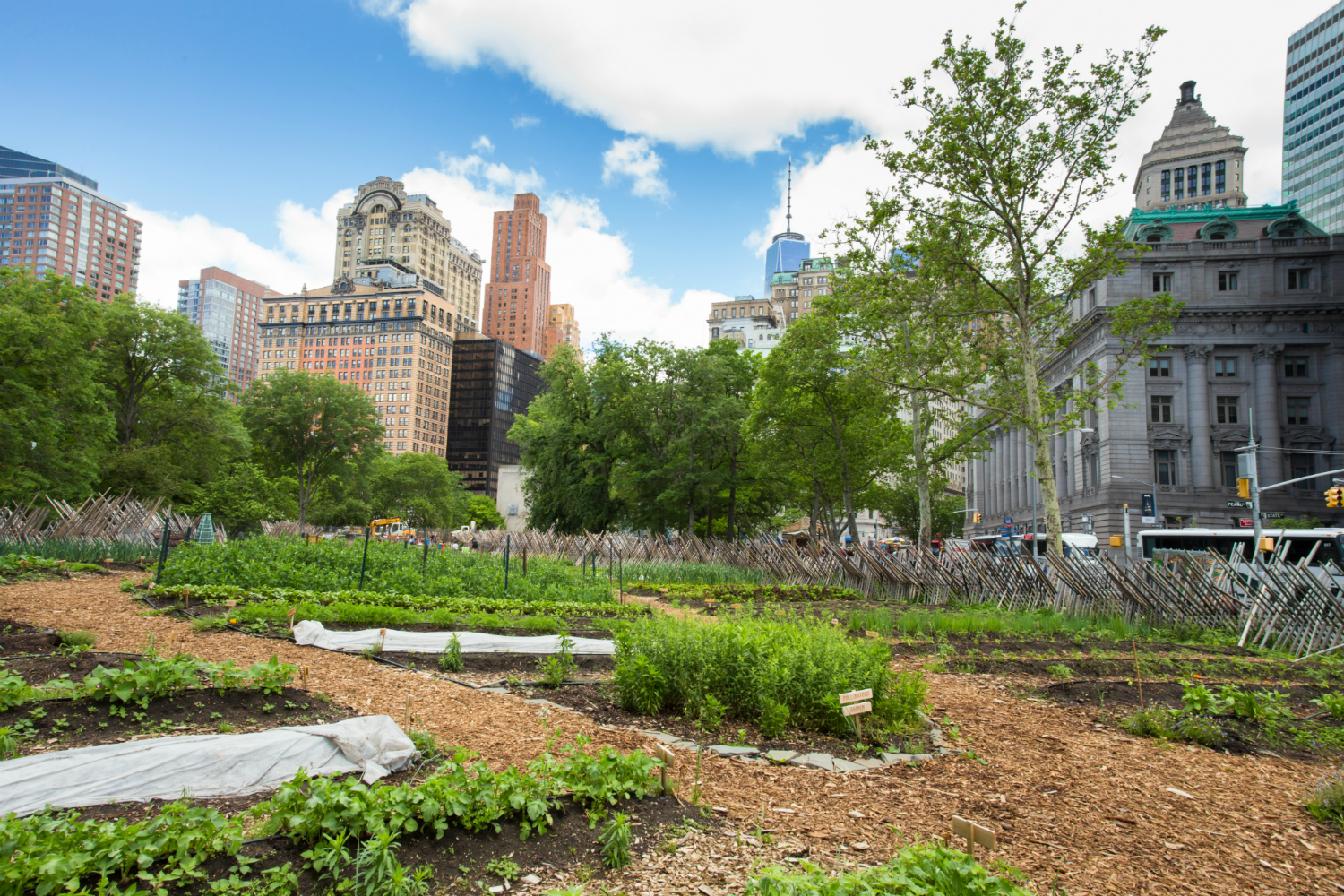By Katherine Ripley
Urban agriculture is alive and well in New York City, and urban farmers come from a wide variety of neighborhoods and backgrounds. Let’s get to know 10 farmers who are working to bring fresh, local food to their communities.
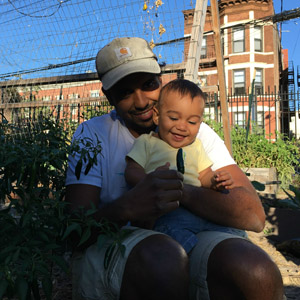 Aazam Otero
Aazam Otero
Aazam Otero is one of the founders of Morning Glory Garden in the Bronx, which is both a community farm and a space where individuals can tend to personal beds. Morning Glory Garden was founded in 2014, and its mission is to provide healthy, organic and affordable food to the community. Produce from the farm is sold at various Bronx locations.
Aazam works full time in aviation but devotes as much time to Morning Glory Garden as he can. Food security and access to green space are extremely important issues for him.
Hometown: Bronx, NY
Favorite vegetable: Tomatoes, kale and rapini.
Favorite farm fresh meal: I always like a fresh salad with spicy greens, and I like cooking down fresh tomatoes into a sauce for pasta, etc.
Favorite farming book: Vegetable Gardener’s Guide to Permaculture (Chris Shein)
Favorite thing about farming in NYC: “The ability to disappear into something that is simple, relaxing and rewarding. It’s a very unique experience. Not many people get the opportunity to do this in NYC; farming and even basic gardening are not synonymous with most people’s experiences here.”
Biggest challenge of farming in NYC: “Logistical hurdles, transporting materials, never having enough time and never-ending litter.”
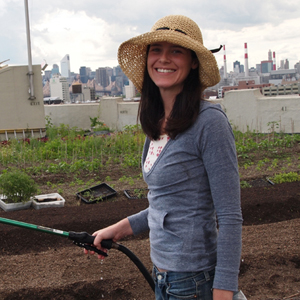
Cara Chard
Cara Chard is the executive director of City Growers, a farm education and advocacy organization that works with the Brooklyn Grange farm. Cara is a former New York City schoolteacher and uses her experience in education to teach children and teens about farming. Cara is also an experienced beekeeper.
Hometown: Fairfield, CT
Favorite farming book: The Queen Must Die and Other Affairs on Bees and Men, by William Longgood
Favorite vegetable: turnips
Favorite farm fresh meal: tomato & basil (& olive oil & possibly fresh mozzarella)
Favorite thing about farming in NYC: “Having access to a lush and peaceful refuge above the craziness of the city”
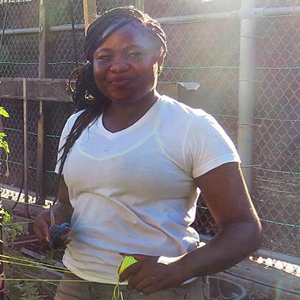 Iyeshima Harris
Iyeshima Harris
Iyeshima Harris is a farm manager for Ecostation New York and an organizer for the Youth Food Justice Network. She is currently transitioning from being an urban farmer to being a political organizer advocating for food justice. Iyeshima believes that urban farming is just one component of food justice, and she wants youth in the city to understand why people fight for food. Iyeshima also wants youth in the city to experience what she experienced growing up in Jamaica, where her great grandmother had a garden, and her family did not need to go to the supermarket for anything.
Hometown: St. Catherine, Jamaica
Favorite vegetable: Breadfruit, eggplant
Favorite farm fresh meal: Curry chicken with white rice and steamed veggies
Favorite thing about farming in NYC: “Having to educate adults and my peers about the importance of food justice. When I tell people that I’m an urban farmer and my field of study is food justice, they’re like ‘What is that? I’ve never heard of that. What are urban farms? Are those the little food lots with little green stuff growing in there?’
So that’s my favorite part is explaining and educating people about food justice. My professor recently asked ‘What do you do?’ and I was telling him I’m an advocate for food justice, and I’m an urban farmer. I want to educate people on the importance of food justice, and that everything is interconnected.”
Biggest challenge of farming in NYC: “Not enough space. You may think there’s a lot of empty lots that we can farm and grow in. In reality that’s not the case. The city might have its own purpose for that space. And even if they give us that space, there’s usually a contract that in 2-5 years they’ll take that space away from you.
It’s painful for farmers when they’ve dedicated they’re time and energy and everything in resources that they can give, and for that to be snatched away from them, literally. What happens when a petition doesn’t work and the city still takes that space away from you?
Also, not enough funding for us urban farmers. It’s hard maintaining staff and wanting to expand if there’s no funding. A lot of times if you apply for funding, there’s these small factors that you have to think about. There will be one thing with the criteria that will make you not get funding for your program. I’ve seen that happen with organizations I’ve worked with.”
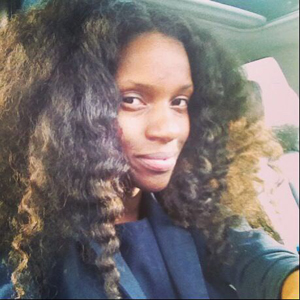 Janelle Carter-Small
Janelle Carter-Small
Janelle is Education and Immersion Trip Coordinator for The Youth Farm, which is located in Prospect Lefferts Gardens in Brooklyn. Janelle focuses on promoting community building, education, and wellness amongst visiting students, educators and families.
Janelle teaches an Agri-STEM curriculum that she developed for children between the ages of 2 and 18. The curriculum connects The Youth Farm to New York City history, New York State Social Studies, ELA and math learning standards, as well as Next Generation Science Standards, all while teaching about food justice and food sovereignty.
Hometown: Brooklyn, NY
Favorite farming book: The Color of Food by Natasha Bowens
Favorite vegetable: Callaloo
Favorite farm fresh meal: Steamed fish with onions, celery, carrots, tomatoes and okra…yum!
Favorite thing about farming in NYC: “I absolutely love being able to connect New York City history, the history of the beautiful immigrant population in NYC and food for children of all ages who visit the The Youth Farm and other green spaces in New York City. I enjoy connecting their knowledge of the food they eat at home, where they bought or grew their food, to the farm trip. It is important as a farm educator (like any other educator) that I access every visitors schema, no one comes to the farm with a blank slate, we are learning together. I particularly enjoy making the STEM connections to farming that lots of people were overlooking.”
Biggest challenge of farming in NYC: “I am still a very new farmer, and I am learning to balance the cost of living in New York City with the cost of farming in New York City. Teaching about sustainability and food justice while struggling to pay bills and eat three meals a day is a reality for a lot of urban farmers. Another difficulty in farming in New York City is the fear that one day the land you work on, teach on, build on can be taken.
With that said, what’s not to love about being able to farm in New York City? I was born literally behind the farm in Downstate Hospital. My goddaughter graduated from the High School for Public Service, a school here on Wingate Campus, one of the security guard’s grandsons is on the same baseball team as my older son! (she loves our YF basil) My great aunt lives a few blocks up on Crown Street, my family’s favorite restaurants, museums, and libraries are all around me in East Flatbush, Crown Heights and Prospect Lefferts Gardens. Brooklyn has always been home and I get to help grow and teach about food in my ‘backyard.’”
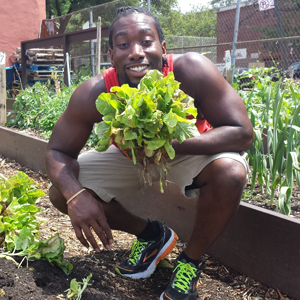 Keron Alleyne
Keron Alleyne
Keron Alleyne is the garden manager of Montauk Community Garden in East New York, which aims to bring together members of the community to grow food and improve quality of life in the neighborhood. Keron has lived in East NY for most of his life, and after he graduated college, he started farming because there was a lack of access to affordable fresh food in the neighborhood. He was also inspired by the elders in his family, such as his grandfather, who grew up in the Caribbean.
Hometown: East New York
Favorite vegetable: Kale. The variety and bitterness makes the experience sweet.
Favorite farming book: Don’t have one really but I’m currently reading The Permaculture City: Regenerative Design for Urban, Suburban, and Town Resilience by Toby Hemingway
Favorite thing about farming in NYC: “I love the idea in action. The fact that I’m in the middle of the concrete jungle where your surroundings are almost always ignored until you reach your destination, but farming and gardening is the exact opposite. It is attention paid to the land that we bypass and giving it the attention that gives you a reward for doing so. Your rewards eventually attract more people and changes the relationship to the city, and surroundings.”
Biggest challenge of farming in NYC: “The lack of space and interest in where your food comes from. Most people are fine with the status quo. From government administrators to your average citizens which effectively reduces our voice in how the land is used. NYC is on a build frenzy and is further moving away from our connection to the land.”
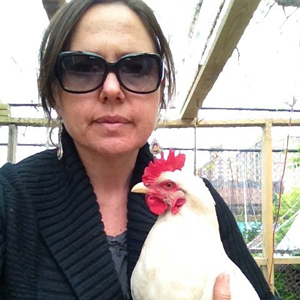 Lily Kesselman
Lily Kesselman
Lily Kesselman is the co-founder and director of the South Bronx Farmers Market and the founder of Brook Park Chickens, a community chicken coop in which the hen caretakers share the eggs that the hens produce.
Hometown: Bainbridge Island, Washington
Favorite vegetable: Leeks
Favorite farm fresh meal: Anything roasted, vegetables or meats
Favorite farming book: A Chicken in Every Yard
Favorite thing about farming in NYC: “I think local food just tastes better. I also like how urban farming really heals the environment and the soil and the earth. Urban farmers are really thoughtful and concerned about what’s going into their bodies, and so I feel the practices are great and it just tastes better.
Also I love how people are kind of surprised…like, ‘Oh you have chickens?’” It’s really doable, it’s really easy, but it’s kind of novel. But I wish that novelty would kind of go away so more people could grow food or support people who do.”
Biggest challenge of farming in NYC: “Soil remediation. I think there’s a lot of toxins in soils, but that can be remedied, it just takes time. Also I think people don’t have a lot of time to do it. You need to tend to it [your farm bed] every day, most people work all the time.”
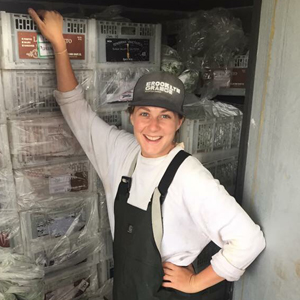 Liz Dowd
Liz Dowd
Liz Dowd is the farm manager of Brooklyn Grange’s flagship farm in Long Island City. Brooklyn Grange’s Flagship Farm and Brooklyn Navy Yard farm are the world’s two largest rooftop soil farms.
Hometown: Burlington, VT
Favorite vegetable: I’m going to cheat and say tomato. Although it’s a fruit, I just love those divas!
Favorite farm fresh meal: The one I make for lunch everyday! A handful of fresh greens with some spicy mustards tossed in there topped with sliced cucumbers and tomatoes. Add a fried egg on the side if you’re turning a compost pile after lunch.
Favorite farming book: While there are many classics, currently I am re-reading The Lean Farm.
Favorite thing about farming in NYC: “I get to be a part of the diversity and culture in our city, while also escaping to the farm for some quiet. It’s important to me to be amongst my community and contribute to the growing needs of our city. I also appreciate having a relationship with those who I am growing for, such as the chefs that use our produce. In many ways growing food is a very creative collaboration.”
Biggest challenge of farming in NYC: “Currently there are so few opportunities for farmers in the city. We need to continue to advocate for vacant lots and rooftops so that we can utilize more growing space and create more jobs in urban agriculture.”
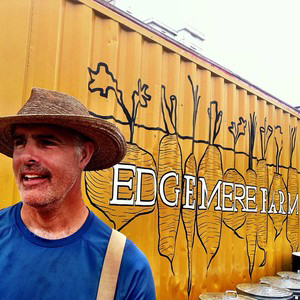 Matt Sheehan
Matt Sheehan
Matt Sheehan is the founder of Edgemere Farm, a half acre urban farm in Far Rockaway, Queens. Matt was a New York City public school teacher for 15 years. He first became involved with urban farming when his school participated in a farming program called Added Value in Red Hook. Matt continued to volunteer with Added Value, and he also helped start a garden at his school. Eventually, he founded Edgemere Farm, which has been running for five years.
Hometown: Plymouth, MA
Favorite vegetable: Radishes
Favorite farm fresh meal: Kale pesto on anything
Favorite farming book: The Market Gardener by Jean-Martin Fortier, or anything by Eliot Coleman
Favorite thing about farming in NYC: “The community engagement is pretty rewarding and enjoyable. That would be number one, or maybe tied for number one would be to bring some open space and connection—to allow people to connect with the natural world in a fairly easy and immediate way.”
Biggest challenge of farming in NYC: “Space would be number one—getting space, securing space. And then the next biggest challenge would be what you’re gonna grow your stuff in. Soil is not static; it is ever evolving and devolving and needs to be fed. It’s a living organism that needs care and inputs and those inputs are just not easy to come by.
We make compost [at Edgemere Farm], but because we can’t focus on it because there’s so many other things going on, it has a lot of weed seeds in it. So you spread our compost on our garden you’re growing weeds, and that multiplies your labor. Your weed management becomes 50 percent of your work and food production becomes the other half. Good quality compost for vegetable production is not easy.”
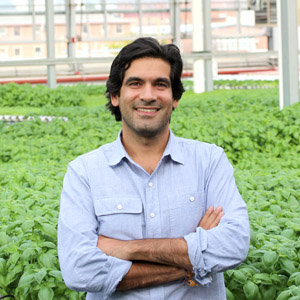 Viraj Puri
Viraj Puri
Viraj Puri is the co-founder and CEO of Gotham Greens, an urban farming company that grows food in rooftop greenhouses located in Gowanus, Greenpoint and Queens. Viraj was inspired to start an urban farming business while working with a New York City environmental engineering firm. Viraj and his partners, Eric Haley and Jenn Nelkin Frymark, built their flagship rooftop greenhouse in 2011. They nowThey now run four greenhouses, three in New York and one in Chicago.
As an urban farmer, Viraj’s main goal is to provide city residents with a consistent supply of sustainably grown produce, and to make city communities more healthy and green.
Hometown: New York/Chicago
Favorite farming book: The Farmer’s Almanac, One Straw Revolutionary by Masanobu Fukuoka and Rooftop Growing Guide by Annie Novak
Favorite vegetable: All leafy greens. If I had to pick one I would say arugula.
Favorite thing about farming in NYC: “Growing premium quality produce in the heart of one of the largest and most densely populated cities in the world! And producing hundreds of full time jobs and economic development opportunities. In 2011, when we built our flagship greenhouse in Brooklyn, NY, it was the first commercial scale rooftop greenhouse in the United States. Greenpoint was a welcoming neighborhood with an edgy mix of industrial, art, and residential real estate. There was a great deal of innovation happening in Greenpoint across various sectors. We’ve been expanding our operations since 2011 and now have built and operate 4 greenhouse facilities across 2 cities—NY and Chicago. Delivering hyper-locally in the city means we’re able to reduce food waste while eliminating the need for long distance trucking. We harvest our products every morning so they can be on retail shelves by lunch and provide our retail, restaurant, and institutional customers with a reliable, year-round, local supply of produce grown under the highest standards of food safety and environmental sustainability. Urban agriculture is unlikely to become the sole source of NYC’s food supply, however it can plan a meaningful role in promoting a strong and vibrant regional food shed in addition to economic development opportunities.”
Biggest challenge of farming in NYC: “Our biggest challenges have always pertained to finding the right real estate, managing logistics, managing regulatory challenges (zoning, permitting, etc.), and high upfront costs. Now that we’ve become a midsized company with 150+ full-time employees, there are of course new challenges. In the past year we’ve invested a lot of resources into developing stringent food safety plans and other operational and human resources related policies and procedures.”
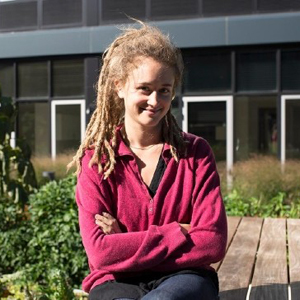 Zaro Bates
Zaro Bates
Zaro Bates is the farmer-in-residence for Urby Organic Farm, located in Staten Island. Zaro is in charge of maintaining the 4,500 square foot growing space, which yields over 50 kinds of produce. She also facilitates community engagement events, such as a veggie pick up bundle, a weekly farm stand, and public gardening workshops.
Hometown: Brooklyn, NY
Favorite farming book: We regularly consult How to Grow More Vegetables, The Market Gardener, and The Urban Farmer
Favorite vegetable: Alexandria zucchini
Favorite farm fresh meal: Sunday roast
Favorite thing about farming in NYC: “Great customers”
Biggest challenge of farming in NYC: “Growing space at a premium”

